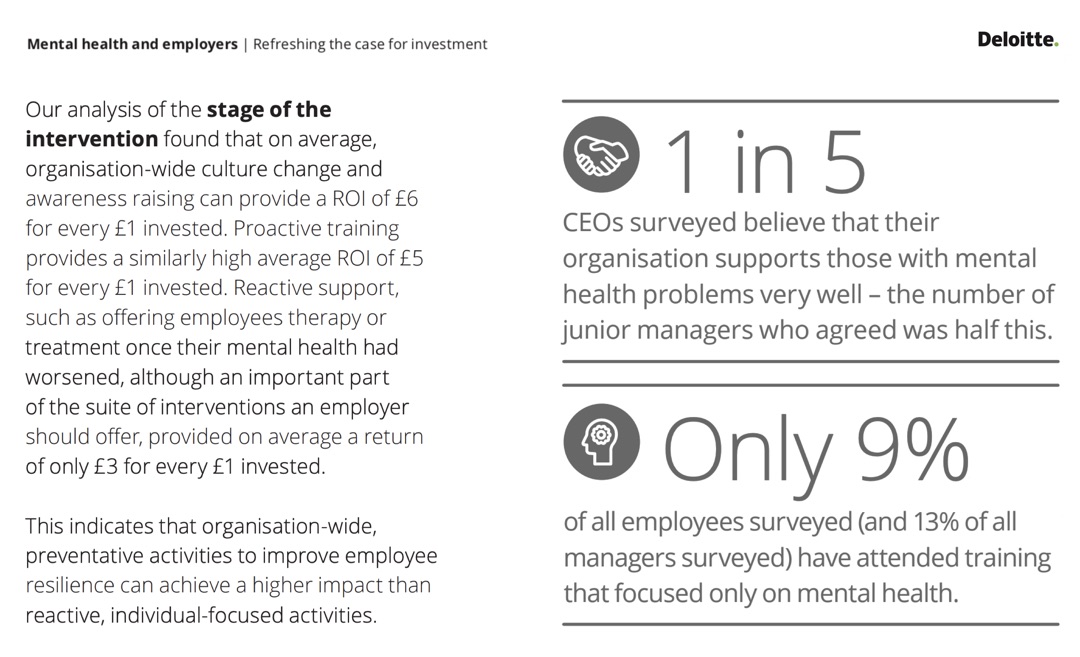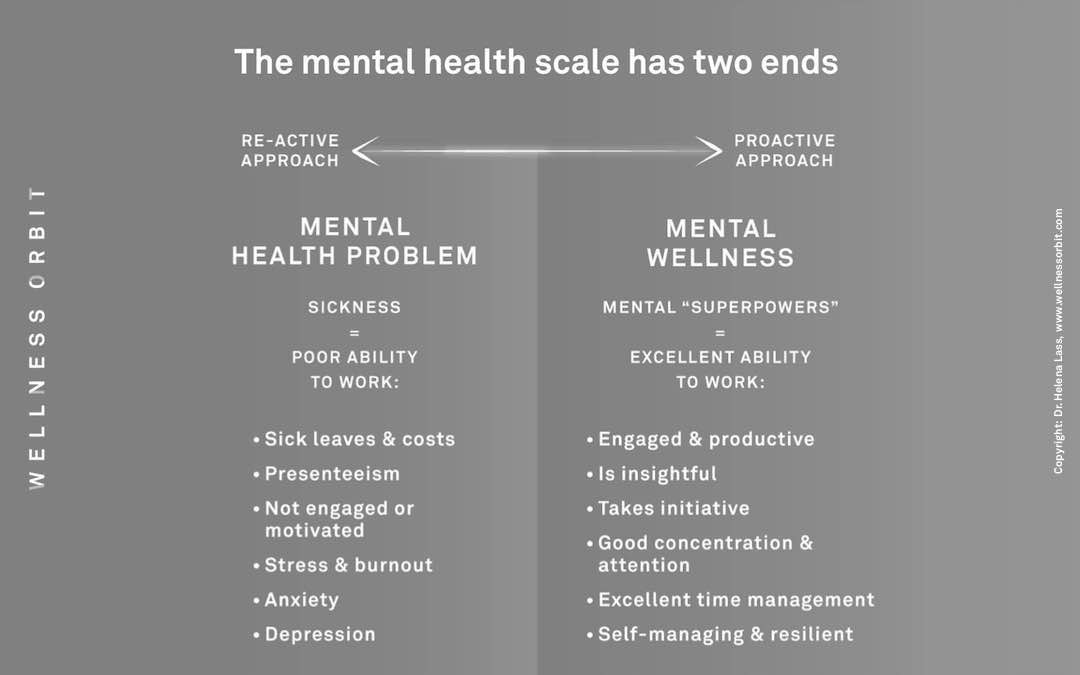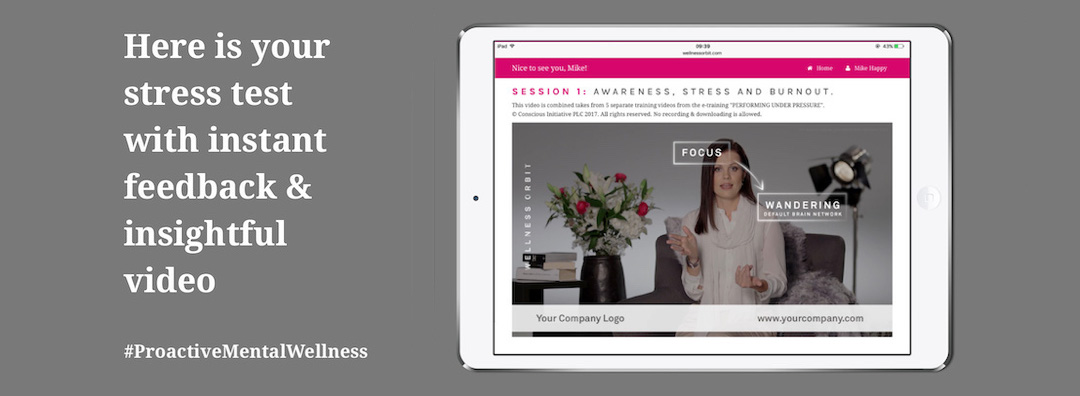Intrapersonal skills secure excellent mental wellness at work
The common problem related to mental health at work such as stress, burnout, or even mental illnesses such as anxiety and depression are the result of lacking good mental wellness.
Somehow people hope that they can just have mental well-being without doing anything for their own inner wellness. This hope is false as in 2018/19 stress, depression or anxiety accounted for 44% of all work-related ill health cases and 54% of all working days lost due to ill health according to the HSE report 'Work-related stress, anxiety or depression statistics in Great Britain, 2019'.
But that isn't the whole story, as many as 42% of employees in the UK call in sick claiming to be suffering from a physical illness when the real reason is a mental health issue, this is according to a report by a health insurance provider BHSF.
It clearly shows that mental well being in the workplace hasn't been a priority and most employees don't take any conscious action that allows them to stay mentally healthy. And when the problem hits them, they are afraid to admit it.
TALKING ABOUT MENTAL HEALTH AT WORK IS A GREAT START BUT NOT ENOUGH
Mental health was again a hot topic at the 2020 World Economic Forum in Davos, where this year’s Crystal Awards winner Deepika Padukone stressed the importance of addressing mental health issues when building a more sustainable and inclusive world.
This well-known Indian actress and the founder of Live Love Laugh Foundation stated it clearly: “In the same way you take care of your physical health, it is important to take care of your mental health.” Only so far we think that this has nothing to do with me. Somehow we fail to see that absolutely everyone has mental health.
The real question is: Is your mental health good or bad?
Thinking about mental health only when you are ill would be similar as to start thinking about training your physical body when you have a physical illness. We all know this is far too late and we need to start to train our physical fitness while we are healthy. So, the question is why we avoid training our mental fitness?
We were happy to hear that Deepika Padukone and Dr. Tedros Adhanom Ghebreyesus, the Director-General of the World Health Organization (WHO) agree that mental health should be included in the United Nations sustainable development goals. The real question here is again: How do we take this mental health talk to an easily actionable opportunity at work.
The good news is, we have been developing practical mental wellness trainings for your team longer than anyone else as our founder and well-known psychiatrist Dr. Helena Lass has had a passion for the proactive mental wellness approach for more than 10 years now.
PREVENTION IS BETTER THAN THE CURE
Dr. Lass wrote in her scientific paper 'Developing Intra-Personal Skills as a Proactive Way to Personal Sustainability - The Preventative Side of the Mental Health Equation' back in 2018 that “The majority of problems in personal wellbeing, professional excellence, and intra-personal health exist due to the global lack of understanding on intrapersonal functions and respective skills.” This comes down to the fact that none of us have had mental wellness lessons at school.
We lack intrapersonal education as the systematic approach to mental fitness has been missing. Dr. Lass continued in her scientific paper: “Health and sustainability of an individual and the collective depend almost entirely upon personal awareness to provide an ability to perceive the internal as well as the physical environment around us in a realistic manner.”
Currently, we don't perceive our hopes around mental health very realistically. We hope that when we talk about mental health problems it is somehow enough. For solving any problem we must move beyond acknowledgment and start focusing on a realistic solution, such as the proactive mental wellness approach at work.
LEARNING INTRAPERSONAL SKILLS AT WORK IS THE PROACTIVE APPROACH TO MENTAL HEALTH
Dr. Lass wrote it well in the same paper, “Proactive interventions to increase the quality of life as well as prevention in psychiatry can be furthered through intrapersonal education. This new kind of inner education will emphasise a conscious focus on the individual as a starting point for transformation towards sustainable lifestyles and society. To change one’s internal functioning is the most positive step one can take to contribute towards increase for personal and world harmony.”
The proactive mental wellness approach has the best ROI according to Deloitte UK (see the graph below). To increase productivity and employee engagement we need to remove the inner problems that stand in the way of employee’s personal ability to focus on the task at hand. In this context, the proactive mental wellness approach becomes more than just a way to improve health and wellbeing.

So, we need to turn around the current paradigm about mental health that sees the cause of mental health issues that can be fixed by solving external problems in a reactive manner. There is tons of proof, that a reactive approach (such as treatment and therapy) alone isn't enough.
Our constant exposure to outside stressors triggers our intrapersonal stress reactions and those inner reactions are the fundamental cause of why we feel stressed in the first place.
Stress is today responsible for almost half of the working days lost in the UK due to health issues. Stress is also a major pathway to burnout and can often cause anxiety and depression.
|
EMPLOYERS WIN FROM EMPLOYEE MENTAL WELLNESS
Employers stand to win a lot by giving their employees access to intrapersonal education as it reduces stress, at least is if they want their highest performing staff members to stay well, creative, and engaged at work.
Training mental fitness proactively is the pathway forward unless we prefer to move back to a slow disconnected lifestyle in the countryside where outer silence was a natural part of everyday life.
Mental toughness and intrapersonal wellness are about making inner silence accessible in a world where silence is often completely missing as constant stimulus arrives to our phones via the Internet and media surrounding us 24/7.
Honestly, when was the last time you had lunch in an environment with zero screens, phones, and newspapers around you?
WHY IS CONSTANT EXTERNAL STIMULUS A PROBLEM WITHOUT PROPER INTRAPERSONAL SKILLS?
Why is the constantly arriving information flow a problem? The exposure to constant outer stimulus drives constant inner reactivity.
The total lack of practical intrapersonal skills leaves us vulnerable and is the main cause of stress. This means that our minds are high-jacked by constant novelty and run on the ‘monkey mind’ regime, jumping from stimuli to stimuli. Meaning we lack focus and inner peace. So, it is no wonder that we are innerly stressed, tired, anxious, and unproductive.
Try to get work done by constantly jumping around your desk. It would be difficult! But we let our minds to ‘jump’ after whatever distraction comes along. There is almost no mental pause there is no relaxing inner silence.
WHAT IS YOUR MIND CAPABLE OF?
No wonder that we lack access to creativity and insights that demand inner silence for their appearance. We don't even often know what our minds are capable of, as our minds aren't trained to perform well. This wellbeing website solves this problem as it focuses on the right side of the mental wellness scale (see the graph below).

WHY MENTAL FITNESS IS SO IMPORTANT?
The fact is that the pattern of how your mind interprets the situation often starts with an ‘automatic’ inner reaction that triggers related emotions and thoughts. When Dr. Lass studied thousands of scientific papers before writing her own, she found that there is enough scientific evidence that events in our mind have an effect on the functions and structure of our brain.
Our mental patterns formulate our habits by connecting similar repeated experiences. The problem is that we often aren't aware of this repetition. We also don't observe our habits objectively and are thus blind to the destructive daily intrapersonal acting patterns that we perform.
The awareness-based practical intrapersonal skills that Wellness Orbit e-trainings enable you to learn to allow you to notice how you act and rewire your brain’s activity so that a more sustainable path towards inner wellness emerges. Noticing when your mind gets high-jacked allows you to choose if you go along with it or not.
WHY TRAINING PRACTICAL INTRAPERSONAL SKILLS IS IMPORTANT?
Intrapersonal skills aren't a theory, only the practical training of inner skills has the potential to take you off from the ‘autopilot mode’ and enable you to respond adequately to any external situation.
Applying intrapersonal skills in real-life situations at work gives you more objectivity and enables you to notice when you fall into the pathways that have the potential to make you stressed and mentally ill. You will become literate to notice the early warning signs of mental health problems and know how to reduce your intrapersonal stress. You will become more aware of where your awareness is and take full responsibility for your actions and thus work well.
TRAINING A HEALTHY MIND KEEPS IT MENTALLY FIT
The proactive mental wellness approach at workplaces is for all employees, especially for those who are still well (lack mental health problems and illnesses), and it delivers skills on how to stay mentally fit.
In that sense, we can say that training your mental fitness is similar to going to the gym. Only in this case, we train your mind so that you would be equipped to deal with the fast-changing world, family stresses, and work situations full of daily pressure and the need to perform impeccably well.
CONCLUSION
Definition of mentally healthy means that you have a bright mind that supports your work and is trained to notice ways to improve wellbeing. Well being exercises keep you on the right side of the mental health scale and allow you to thrive.
The mental wellness programs at work that we offer on this mental wellness gym equip you with practical things to do to be mentally healthy.
This blog post is written by Kaur Lass



